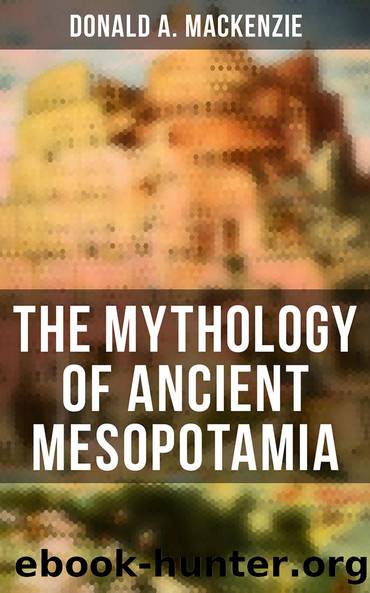The Mythology of Ancient Mesopotamia by Donald A. Mackenzie

Author:Donald A. Mackenzie [Mackenzie, Donald A.]
Language: eng
Format: epub
Tags: Nonfiction, Social & Cultural Studies, Social Science, Folklore & Mythology
ISBN: 4064066393458
Publisher: Musaicum Books
Published: 2020-12-17T05:00:00+00:00
Figure XI.2. THE HORSE IN WARFARE
Marble slab showing Ashur-natsir-pal and army advancing against a besieged town. A battering ram is being drawn on a six-wheeled carriage From N.W. Palace of Nimroud
No traces have yet been found in Palestine of its conquest by the Elamites, nor have the excavators been able to substantiate the claim of Lugal-zaggizi of a previous age to have extended his empire to the shores of the Mediterranean. Any relics which these and other eastern conquerors may have left were possibly destroyed by the Egyptians and Hittites.
When Hammurabi came to the throne he had apparently to recognize the overlordship of the Elamite king or his royal son at Larsa. Although Sin-muballit had captured Isin, it was retaken, probably after the death of the Babylonian war-lord, by Rim-Sin, who succeeded his brother Warad-Sin, and for a time held sway in Lagash, Nippur, and Erech, as well as Larsa.
It was not until the thirty-first year of his reign that Hammurabi achieved ascendancy over his powerful rival. Having repulsed an Elamite raid, which was probably intended to destroy the growing power of Babylon, he "smote down Rim-Sin", whose power he reduced almost to vanishing point. For about twenty years afterwards that subdued monarch lived in comparative obscurity; then he led a force of allies against Hammurabi's son and successor, Samsu-iluna, who defeated him and put him to death, capturing, in the course of his campaign, the revolting cities of Emutbalum, Erech, and Isin. So was the last smouldering ember of Elamite power stamped out in Babylonia.
Hammurabi, statesman and general, is one of the great personalities of the ancient world. No more celebrated monarch ever held sway in Western Asia. He was proud of his military achievements, but preferred to be remembered as a servant of the gods, a just ruler, a father of his people, and "the shepherd that gives peace". In the epilogue to his code of laws he refers to "the burden of royalty", and declares that he "cut off the enemy" and "lorded it over the conquered" so that his subjects might have security. Indeed, his anxiety for their welfare was the most pronounced feature of his character. "I carried all the people of Sumer and Akkad in my bosom", he declared in his epilogue. "By my protection, I guided in peace its brothers. By my wisdom I provided for them." He set up his stele, on which the legal code was inscribed, so "that the great should not oppress the weak" and "to counsel the widow and orphan", and "to succour the injured.... The king that is gentle, king of the city, exalted am I."278
Hammurabi was no mere framer of laws but a practical administrator as well. He acted as supreme judge, and his subjects could appeal to him as the Romans could to Caesar. Nor was any case too trivial for his attention. The humblest man was assured that justice would be done if his grievance were laid before the king. Hammurabi was no respecter of persons, and treated alike all his subjects high and low.
Download
This site does not store any files on its server. We only index and link to content provided by other sites. Please contact the content providers to delete copyright contents if any and email us, we'll remove relevant links or contents immediately.
The Daily Stoic by Holiday Ryan & Hanselman Stephen(3322)
The Fate of Rome: Climate, Disease, and the End of an Empire (The Princeton History of the Ancient World) by Kyle Harper(3067)
People of the Earth: An Introduction to World Prehistory by Dr. Brian Fagan & Nadia Durrani(2736)
Ancient Worlds by Michael Scott(2688)
Babylon's Ark by Lawrence Anthony(2679)
The Daily Stoic by Ryan Holiday & Stephen Hanselman(2575)
Foreign Devils on the Silk Road: The Search for the Lost Treasures of Central Asia by Peter Hopkirk(2464)
India's Ancient Past by R.S. Sharma(2454)
MOSES THE EGYPTIAN by Jan Assmann(2417)
The Complete Dead Sea Scrolls in English (7th Edition) (Penguin Classics) by Geza Vermes(2283)
The Earth Chronicles Handbook by Zecharia Sitchin(2229)
Lost Technologies of Ancient Egypt by Christopher Dunn(2226)
24 Hours in Ancient Rome by Philip Matyszak(2084)
Alexander the Great by Philip Freeman(2065)
Aztec by Gary Jennings(2029)
The Nine Waves of Creation by Carl Johan Calleman(1917)
Curse Tablets and Binding Spells from the Ancient World by Gager John G.;(1862)
Before Atlantis by Frank Joseph(1854)
Earthmare: The Lost Book of Wars by Cergat(1825)
